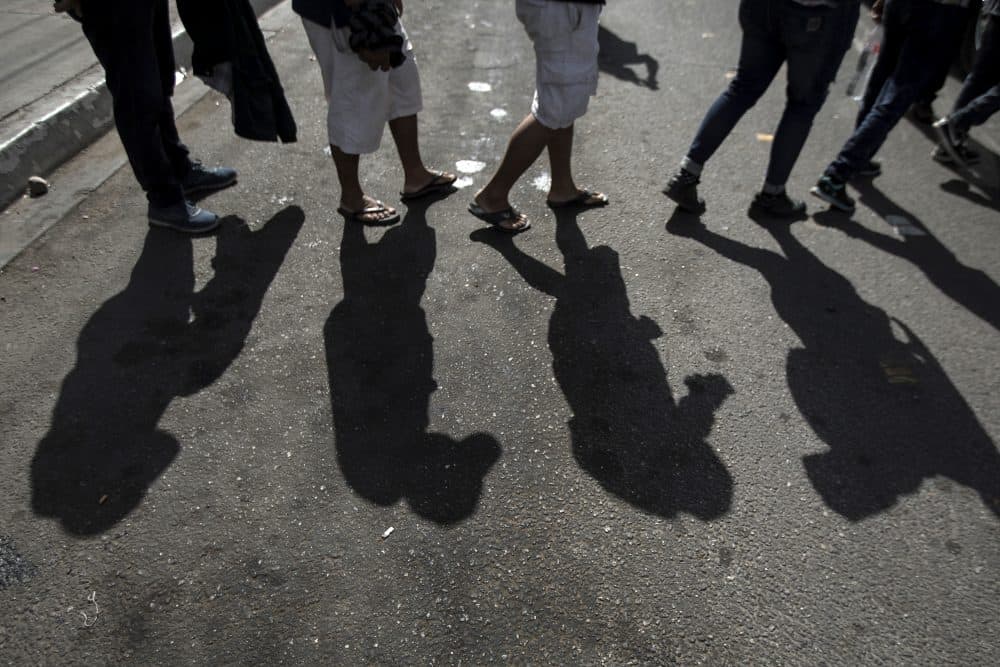Advertisement
Opening Borders Would Double World GDP, Economist Says
Resume
Development economist Michael Clemens says easing border restrictions would double world GDP, as workers move to countries where they can be more productive.
Here & Now's Robin Young talks with Clemens (@m_clem), who is not an advocate for open borders, about the idea.
Interview Highlights
On wage differences between countries and how immigration benefits both laborers and employers
“One of the most remarkable things about the world in economic terms is that what you earn depends mostly on where you are. The exact same person, doing the exact same task in Haiti, coming to the U.S., doing the same work, same exact task in that job, can earn six or seven times more in real economic terms, just for doing the same thing.
“We say that for success in life, it's not mostly what you know, but who you know. In the world, more broadly, it's not what you know or who you know as much as where you are.
“When a Haitian earns money in the United States, that's not charity. Wages aren't charity. You get paid wages because you are adding at least that much value to an employer and to the economy more broadly. So, what that wage difference reflects is that those workers are enormously more productive in one place than the other. The flipside of that is, when you block that person at the border, you take that potential economic contribution away. It doesn't just impoverish the migrant, it takes away the economic contribution that they could make to the world, which is the reason they're earning more money.”
"They emerged from poverty by moving. And that's something that's in the family experience of a lot of Americans."
Michael Clemens
On how people from Sweden and Haiti immigrated to the U.S. at different points in history with similar intentions of escaping poverty
“The vast majority of people [who] emerged from poverty who were born in Haiti did it by leaving Haiti, and that's nothing new. A lot of people for example in the United States have historical origins in Sweden. Sweden used to be a pretty poor country, and that's the reason why between 1860 and 1930, almost 20 percent of Sweden left permanently. They emerged from poverty by moving. And that's something that's in the family experience of a lot of Americans.
“Migration was part and parcel of Sweden's economic development, and that's certainly true for Haiti today. Haiti got a lot of aid after the catastrophic earthquake of 2010, but they get much more in money from relatives abroad than they get in foreign aid. It's a very important part of economic development at home.”
On the history of people in the U.S. fearing that if they open their borders to immigrants, they will lose jobs and wages will go down
“This is something we have a very long experience with in the United States. For example, between 1882 and 1965, with immaterial exceptions, the U.S. banned all Chinese immigration. And it's very clear why they did that: They were afraid of Chinese people taking American jobs, somehow degrading American culture. And there were public health concerns too. In 1965, that policy was completely reversed, and you can see that none of those predictions came true. So it is hypothetically possible for that to happen, but it's not like the U.S. doesn't have experience.”
"...immigration is an investment. It's not a handout. It's not just a cost. Like any investment, it can have up-front costs. But like any good investment, the long-term benefits enormously exceed those costs."
Michael Clemens
On the view that immigration is a positive investment, not something that drains the U.S. economy
“The vast majority of immigrants certainly do not come to the United States for public benefits. Immigration from Mexico collapsed right after 2006, coinciding exactly with the collapse of housing starts in the U.S., because so many of them [Mexican immigrants] were working in construction. Nothing changed about welfare benefits right after 2006. What's changed was jobs, and people more or less stopped coming. That's a really strong indicator that people are coming to contribute to the economy, they're coming to work hard, they're mostly not coming for benefits.
“There's a blue-ribbon panel that was put together by the National Academy of Sciences of some of the best labor economists who study immigration across the political spectrum a couple of years ago. They did a comprehensive assessment of the fiscal effects of migrants: Do they put in more money into public coffers than they take out? And the consensus of all of those economists was that after a generation, that is including the children of new migrants, that fiscal effect is positive. So, yes, there are some start-up costs, but very soon, children of immigrants and their children just look a lot like Americans, and Americans aren't costly to America. Americans are part of America, and they benefit America.
“In a much broader sense, immigration is an investment. It's not a handout. It's not just a cost. Like any investment, it can have up-front costs. But like any good investment, the long-term benefits enormously exceed those costs.”
This segment aired on August 6, 2018.